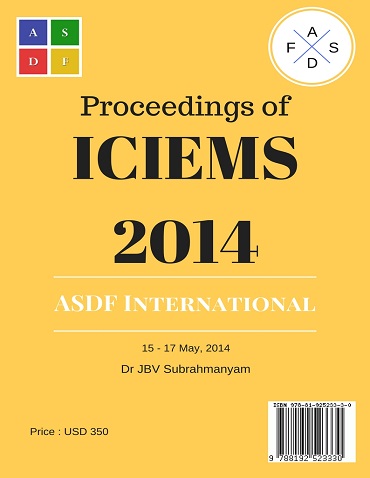- Publication Meta:Value
- Short Title:ICIEMS 2014
- Publisher:ASDF, India
- ISBN 13:978-81-925233-3-0
- ISBN 10:81-925233-3-0
- Language:English
- Type:Hard Bound - Printed Book
- Copyrights:[email protected]
- Editor-in-Chief:JBV Subrahmanyam
- Conference Dates:15 - 17, May 2014
- Venue Country:Hyderabad, India
- Submitted Papers:839
- Acceptance Rate:13.98%
- Website:www.iciems.in
Welcome to ASDF Electronic Digital Library!
ICIEMS 2014
ICIEMS 2014
International Conference on Information Engineering, Management and Security 2014
Paper 057
Cancellation of ISI and High Spectral Efficiency Using Adaptive OFDMA
G Madhuri1
1Assistant Prof ECE, Christhu Jyothi Institute of Technology and Sciences
Abstract
The demand for high data rate services has been increasing very rapidly and there is no slowdown in sight. Almost every existing physical medium capable of supporting broadband data transmission to our homes, offices and schools has been or will be used in the future. This includes both wired (Digital Subscriber Lines, Cable Modems, Power Lines) and wireless media. Often, these services require very reliable data transmission over very harsh environments. Most of these transmission systems experience many degradations, such as large attenuation, noise, multipath, interference (ISI), low spectral efficiency time variation, non-linearity's, and must meet many constraints, such as finite transmit power and most importantly finite cost. In such channels, extreme fading of the signal amplitude occurs and Inter Symbol Interference (ISI) due to the frequency selectivity of the channel appears at the receiver side. This leads to a high probability of errors and the system's overall performance becomes very poor. Adaptive orthogonal frequency division multiple access (OFDMA) has recently been recognized as a promising technique for providing high spectral efficiency by updating SCA subcarrier allocation using slow adaptive OFDMA system. This paper proposes a slow adaptive OFDMA scheme, in which the subcarrier allocation is updated on a much slower timescale than that of the fluctuation of instantaneous channel conditions However, such “fast” adaptation requires high computational complexity and excessive signaling overhead. This hinders the deployment of adaptive OFDMA systems worldwide. We formulate safe tractable constraintsfor the problem based on recent advances in chance constrained programming. Here we apply the chance constrained programming methodology to wireless system designs. We then develop a polynomial-time algorithm for computing an optimal solution to the reformulated problem. Our results show that the proposed slow adaptation scheme drastically reduces ISI and and improves spectral efficiency when compared with the conventional fast adaptive OFDMA. Our work can be viewed as an initial attempt to apply the chance con-strained programming methodology to wireless system designs.
Keywords
Author's Profile
Author profile can be generated and linked through our partners World Book of Researchers. To include your profile online Click Here. After it is approved, please email to edlib @ asdf.res.in to create a link with all the papers.
e-AID
ICIEMS.2014.057
Cite this Article as Follows
G Madhuri. Cancellation of ISI and High Spectral Efficiency Using Adaptive OFDMA. International Conference on Information Engineering, Management and Security 2014. Vol. 1. Chennai: Association of Scientists, Developers and Faculties, 2014. 385-391. Print.
© 2010 - by EDLIB .
All Rights Reserved.

